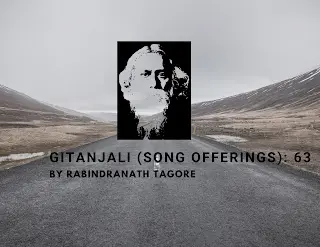Email:learnwith@introspectiveenglish.com
Physical address:
Durgapur, India


Prepare, Practise and Participate

Prepare, Practise and Participate
Rabindranath Tagore (1861-1941) is an Indian poet, Short-story writer, playwright, novelist, social reformer, and painter. He mainly wrote in Bengali but gained global recognition for his works. Tagore also composed the national anthems of India (Jana Gana Mana) and Bangladesh (Amar Sonar Bangla), leaving a lasting impact on both nations. He was the first non-European to receive the Nobel Prize in Literature in 1913 for his profound work Gitanjali (Song Offerings).
Gitanjali is a collection of 103 devotional poems written by Rabindranath Tagore in 1910 in Bengali, and later it was translated into English in 1912.
Tagore received the Nobel Prize in Literature in 1913 for Gitanjali, making a significant contribution to world literature and bringing Indian spiritual and philosophical themes to a global audience.
The poem is written in a reflective and devotional tone, expressing deep spiritual longing and reverence.
It highlights the poet’s profound gratitude for divine grace and explores the eternal connection between the human soul and the Almighty.
Thou – You (archaic, used in poetry and old English)
Hast – Have (archaic)
Uneasy – Uncomfortable, restless
Accustomed shelter – A familiar or known place where human beings are habituated to stay
Abides – Stays, remains
Leadest – Lead (archaic form used for “you lead”)
Endless life – Limitless, eternal life
Linkest – Links, connects (archaic)
Alien – Foreigner, stranger
Bliss – Extreme happiness, spiritual joy
Touch – The divine presence or grace of God
Play of many – The presence of God in many forms

Rabindranath Tagore’s Gitanjali (Song Offerings) 63 is a beautiful poem that explores themes of divine grace, human connection, and the constant presence of the Divine. In this post, we will break down the key ideas in the poem, helping you understand its spiritual message.
Gratitude for Divine Connections
“Thou hast made me known to friends whom I knew not…”
The poem starts with Tagore expressing gratitude to God for helping him form deep connections with people he had never met before. Tagore feels thankful for the divine guidance that led him to be welcomed into new places and relationships.
The line “Seats in homes not my own” shows how divine grace makes us feel at home, even in unfamiliar places. This symbolizes the universal nature of human connection, reminding us that we are all connected by something greater than ourselves.
“Thou hast brought the distant near and made a brother of the stranger” highlights the idea of unity. Divine grace breaks down barriers between people and turns strangers into family.
Theme: Universal Brotherhood & Divine Grace
Overcoming Fear of Change
“I am uneasy at heart when I have to leave my accustomed shelter…”
Here, Tagore admits that he feels uneasy when faced with change or the unknown. The idea of “accustomed shelter” represents the comfort zone we all feel attached to. However, Tagore reminds himself that even in times of change, God is always present.
The phrase “Old in the new” reassures us that even as things change, the divine presence remains constant, helping us move forward with faith and courage.
Theme: Change & Divine Presence
Faith in Divine Guidance
“Through birth and death, wherever thou leadest me…”
Tagore expresses his deep faith in God’s guidance throughout all stages of life, whether in moments of birth, death, or beyond. The line “The same, the one companion of my endless life” suggests that God is always with him, providing guidance, joy, and strength.
“Bonds of joy to the unfamiliar” emphasizes that divine guidance helps turn new and unknown experiences into sources of joy instead of fear.
Theme: Faith in the Eternal Presence of God
🎥 Understand each line of the poem better with this visual explanation.
Unity Through Spiritual Enlightenment
“When one knows thee, then alien there is none…”
Tagore reflects on the idea that when we understand the true nature of God, all feelings of separation disappear. God’s presence transcends all boundaries, and we feel united with everyone, regardless of differences.
The line “No door is shut” symbolizes spiritual enlightenment, where there are no barriers—whether spiritual or social—and we can embrace the world with an open heart.
Theme: Unity of Humanity & Spiritual Enlightenment
The Desire for Divine Awareness
“Grant me my prayer that I may never lose the bliss…”
In the closing lines of the poem, Tagore prays to always remain aware of God’s presence, even in the busy, distracting world around him. He refers to this awareness as “bliss”, symbolizing peace and contentment.
“The one in the play of the many” speaks to the idea that despite the world’s diversity, everything is part of the same divine reality, reminding us that everything in the world reflects God’s presence.
Theme: Divine Oneness & Spiritual Awareness
Conclusion:
Gitanjali 63 is a beautiful reflection on spiritual unity, divine grace, and the ongoing journey of faith. Through this poem, Tagore invites us to understand how God’s presence helps us overcome challenges, find joy in the unfamiliar, and see the unity in all of life. This poem is a call to embrace the divine connection that binds us all, no matter where we go or what changes we face.
Related Posts:
📺Watch the Video: Gitanjali (Song Offerings 63) – Meaning, Themes & Analysis
🌐 Explore More Study Guides, Literary Analysis & English Learning Tips:
🔗 Gitanjali (Song Offerings) 63: Summary & Analysis
👉 Read the Full Summary
🔗 Gitanjali Q&A – Insights & Analysis
👉 View Questions & Answers
🔗 Themes in Gitanjali (Song Offerings) 63
👉 Explore Key Themes
Disclaimer: This content is intended for educational purposes and is based on insights from various educational resources and personal interpretation. The poem “Gitanjali” by Rabindranath Tagore is in the public domain.
Share this content: